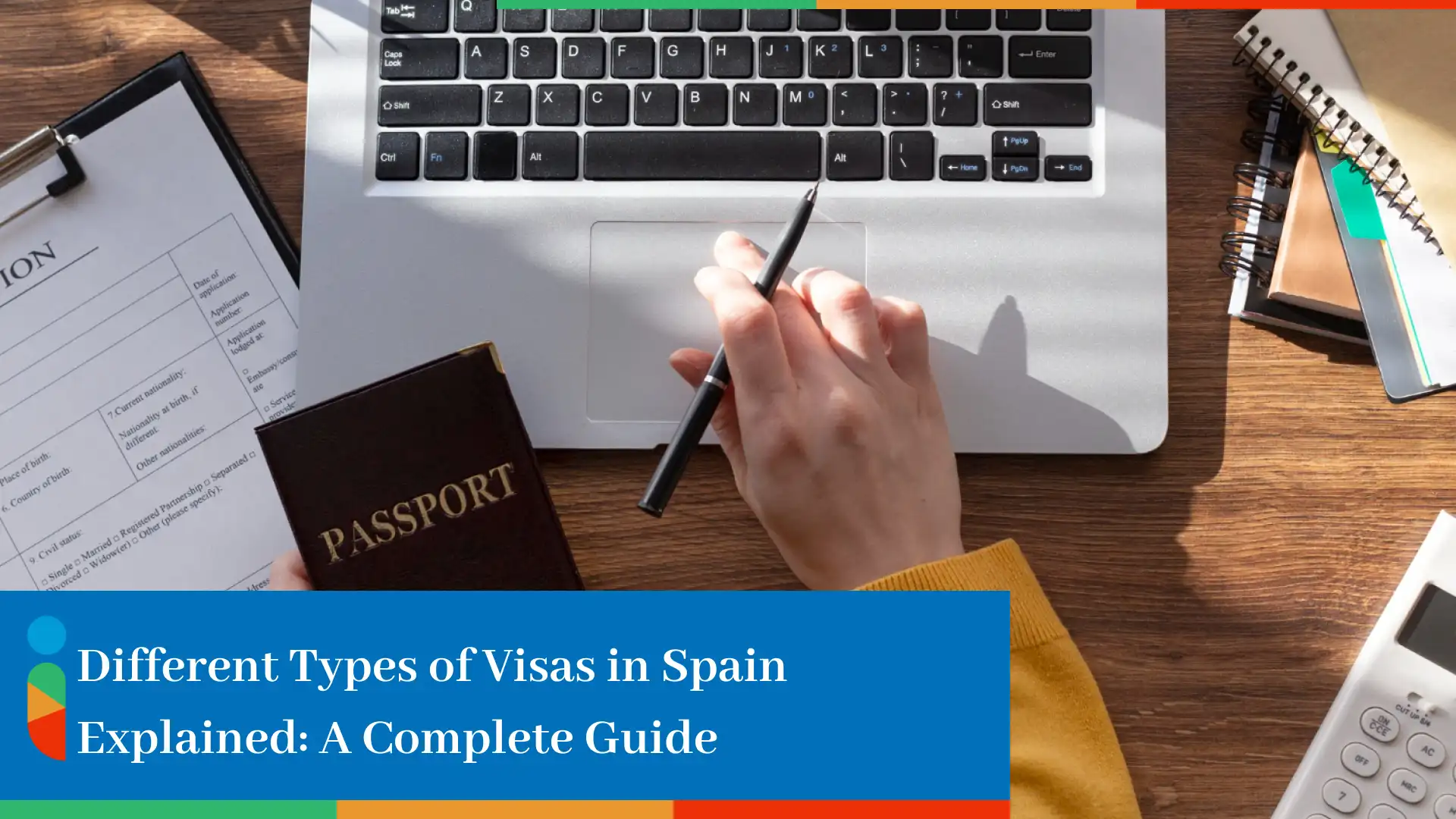Spain’s warm climate, rich culture, and strong infrastructure make it an attractive destination for travelers, students, professionals, and retirees alike. But understanding the different types of visas in Spain-and which one you need-can be daunting, especially for non-EU nationals. In this guide, we break down Spain’s visa system clearly, show you exactly what’s required, and help you avoid common pitfalls.
Spain welcomed 85.1 million international tourists in 2023, an 18.7 % increase over the previous year, reflecting how high demand is for entry and travel in Spain.
When Do You Need a Visa for Spain?
Before diving into types of visa in Spain, it’s critical to know whether you need one. Citizens of the EU, EEA, or Switzerland enjoy full freedom to live, study, and work in Spain without a visa. For many other nationals (like U.S., U.K., Australia), Spain offers visa-free stays of up to 90 days within a 180-day period under the Schengen regime.
If you plan to stay beyond 90 days, study, work, or settle, you must apply for a national visa (Type D). Always check the official Spanish Ministry of Foreign Affairs site for the latest travel rules, since policies can shift due to bilateral agreements or legislative changes.
Main Types of Visas in Spain
Spain broadly divides visas into Short-Stay (Schengen) Visas for stays up to 90 days, and Long-Stay (National) Visas for stays beyond 90 days. Each type has subcategories based on the purpose of your stay-tourism, business, work, study, family reunification, investment, remote work, etc. Below, you’ll find detailed descriptions, eligibility criteria, benefits, and common challenges of each Spain visa.

Short-Stay Visas (Schengen Visas – Up to 90 Days)
Short-stay visas in Spain fall under the Schengen framework, permitting you to stay in Spain or any Schengen country for up to 90 days in any 180-day period. These visas are ideal for:
- Tourism / visiting family or friends
- Business visits / conferences / trade fairs
- Medical treatment
- Short study / training (<3 months)
- Transit through Spain
Common short-stay visa types:
- Tourist / Visitor Visa (Schengen Visa): The most common type, used for holidays, sightseeing, or visiting relatives.
- Business Visa: For attending meetings, seminars, or corporate events.
- Medical Treatment Visa: If you intend to undergo treatment in a Spanish clinic or hospital.
- Airport Transit / Seamen Transit Visa: For passengers connecting flights via Spain or disembarking ships in Spanish ports en route to a non-Schengen destination.
Key requirements (short stay):
- Valid passport with at least 3 months beyond intended stay
- Travel health insurance with minimum coverage of €30,000
- Proof of accommodation
- Sufficient funds (often ~€114/day)
- Return or onward ticket
Even short-stay applicants must submit accurate paperwork-errors or omissions often lead to rejection. One advantage: these visas are processed relatively quickly (often within 15 calendar days).
Long-Stay Visas (National Visas – Over 90 Days)
If your goal is to live, work, study, or invest in Spain for longer than three months, you’ll need a Type D, or national visa. This visa grants not only stay in Spain but allows limited travel within the Schengen area (up to 90 days in 180 days). Below are the most relevant long-stay visa categories for non-EU nationals.
Spain Work Visa (Employment Visa)
For non-EU nationals who want to work for a Spanish employer. The employee visa (residence + work) is a common long-stay visa.
Key conditions:
- You must have a valid job offer or signed employment contract with a Spanish company.
- The employer must secure work authorization from Spanish immigration authorities before your visa is approved.
- The visa is typically granted initially for one year and can be renewed.
There are subtypes: standard salaried employee visa, self-employment visa (for freelancers or business owners), and Highly Qualified Professional Visa (for specialists in strategic sectors).
Because the employer is deeply involved, many companies outsource visa and relocation tasks-hence the value of employment visa outsourcing services. Using an experienced visa partner or HR team can mitigate errors and speed up processing.
Spain’s minimum salary for full-time employment in 2025 is €16,576 per year. After securing a work visa and arrival, your employee relocation process and local registration (NIE, TIE card) begin.
Spain Student Visa
If you’ve been accepted by a recognized Spanish university, college, or institution and plan to stay over 90 days, a student visa is your path.
Requirements include:
- Acceptance letter from the educational institution
- Proof of financial means
- Health insurance covering your stay
- Clean criminal record
With a student visa, you may be permitted to work part-time (typically up to 30 hours/week). The visa is generally valid for the duration of your studies and renewable annually.
Spain hosted over 208,000 international students in recent years – showing growing demand among foreign learners. (Use latest data from Spanish education authorities for your local update.)
Non-Lucrative Visa (Residence Without Work)
The non-lucrative visa is ideal for those who can support themselves financially without working in Spain (for example, retirees or passive income earners).
Highlights:
- You must demonstrate stable passive income (e.g., pensions, investments)-often ~€2,400+ monthly, plus additional amounts per dependent.
- Work or professional activity in Spain is not permitted.
- Renewable after the first year, then generally every two years.
This visa offers a route to residence without the pressure to find a local job-especially appealing for retirees or digital nomads who maintain remote income elsewhere.
Entrepreneur Visa & Golden Visa
Spain offers special long-stay visas for those investing in the country or launching ventures.
- Entrepreneur / Start-up Visa: Granted to innovators or founders whose business plan is considered of “general interest” to Spain (innovation, job creation, technological impact).
- Golden Visa (Investor Visa): For those investing in Spanish real estate (minimum ~€500,000), public debt, or business projects.
With either visa, you can obtain residency and freely travel throughout the EU within Schengen limits. Many investors also use EOR services in Spain to streamline hiring and compliance for any employees they bring.
Family Reunification Visa
Non-EU citizens who have legal residency or Spanish citizenship can bring eligible family members (spouse, children under 18, dependent parents) via this visa.
Requirements include:
- Sponsor must have lived legally in Spain for a certain period (often one year)
- Demonstrate sufficient income and housing capacity to support dependents
- Family members then receive similar residence rights as the sponsor
This visa is a practical option for families wanting to settle together in Spain.
Digital Nomad Visa
Spain recently introduced a visa tailored for remote workers employed outside the country.
Key features:
- Applicants must show remote work contract or proof of remote income (e.g., from foreign company)
- Income thresholds and documentation requirements vary; the visa is initially valid for one year, extendable to up to five years
- Offers tax incentives under the Spanish Startup Law
This visa allows you to legally stay in Spain while working remotely for a non-Spanish employer-ideal for location-independent professionals.
Documents Required for Visa Application in Spain
No matter which visa you apply for, you’ll need a solid, complete document package. Common requirements:
- Valid passport (minimum 3 months validity beyond planned stay)
- Completed visa application form
- Two recent passport-size photographs
- Proof of funds / bank statements
- Proof of accommodation (hotel booking, lease, invitation letter)
- Travel health insurance (with ~€30,000 coverage)
- Purpose-specific supporting docs (employment contract, university acceptance, investment contracts, etc.)
Missing or inconsistent documents are among the most cited reasons for visa rejections. Always double-check consulate-specific checklists. Also, Spanish authorities frequently require documents to be translated into Spanish and legalized (Apostille) as needed.
Common Challenges in the Spain Visa Process
Applicants frequently run into similar roadblocks:
- Appointment slot scarcity especially during peak travel season
- Language and documentation issues – many consulates insist on Spanish translations and local legalization
- Processing delays due to incomplete applications or missing paperwork
- Understanding local labor laws and compliance once you arrive

A Proactive Tip: apply 6-8 weeks before your desired travel or start date, and if your employer lacks capacity, consider partnering with an EOR contract provider. For companies relocating employees, Spain relocation services and using proper Spain relocation services specialists can reduce friction.
Also, note working hours in Spain are capped at 40 hours per week (8 hours/day); overtime is strictly regulated (max 80 paid overtime hours annually). Some proposed reforms would reduce the legal workweek to 37.5 hours without pay cuts.
Conclusion: Choosing the Right Spain Visa for Your Stay
Spain offers a diverse set of visas-from short-term travel visas to long-stay work, study, or investor options. The right visa for you depends on your nationality, purpose, duration, and financial capacity.
Fill out applications meticulously, apply well in advance, and consider using professional support. If your next goal is to relocate or expand to Spain, integrating EOR services in Spain or specialist relocation support can make your transition far smoother.
FAQs
What Is the Difference Between a Schengen (short-Stay) Visa and A National Visa in Spain?
A Schengen visa allows up to 90 days’ stay in Spain (and the Schengen area) for tourism, business, or transit. A national visa (Type D) is for stays beyond 90 days for purposes like work, study, residence, or investment.
How Much Bank Balance Is Needed for A Spanish Visa?
Short-stay travelers often need to show ~€114 per day of stay. For long-stay non-lucrative visas, the requirement is usually monthly income of ~€2,400 (plus additional amounts for dependents). Always check the consulate’s guidelines for your country.
Can I Work in Spain on A Tourist or Short-Stay Visa?
No. Short-stay visas are only for travel, leisure, or short business visits. Any local employment requires a proper work visa.
How Long Does Spain Visa Processing Take?
Schengen visas typically take about 15 days. Long-stay national visa processing can take 30 to 60 days depending on workload and consulate. Apply well in advance.
What Is the Investment Threshold for Spain’s Golden Visa (investor Visa)?
The most common route is real estate investment of €500,000 or more in Spanish property. Other qualifying investments include significant business projects or certain bank/public debt purchases, but thresholds and eligibility vary by option. The Golden Visa generally offers fast-track residency and easier family reunification-check the exact accepted investment types before you commit.
Can I Change My Visa Type After Arriving in Spain (for Example: Student → Work)?
Yes, but it depends on timing and the specific visas. Typically you must apply for the new national visa (Type D) from your home country or country of legal residence; changing from a student visa to a work visa while inside Spain is possible in some cases but often requires leaving and reapplying. Always consult the local immigration office or a visa specialist to avoid gaps in status.






